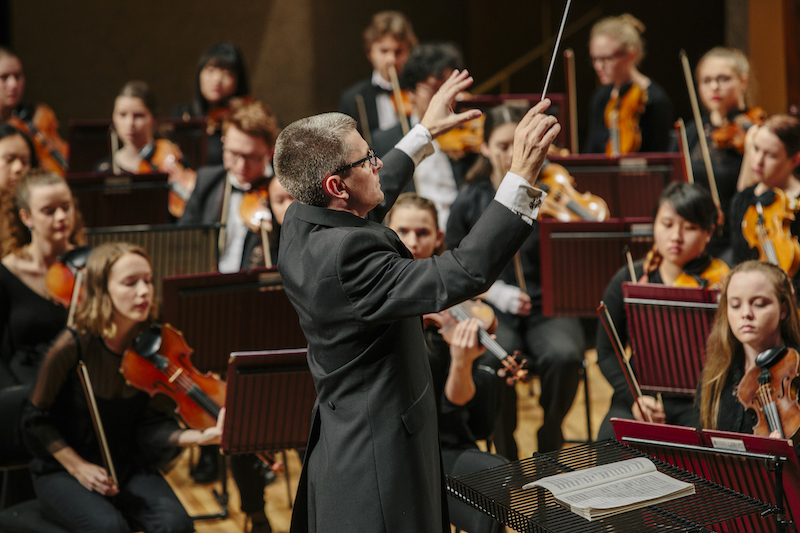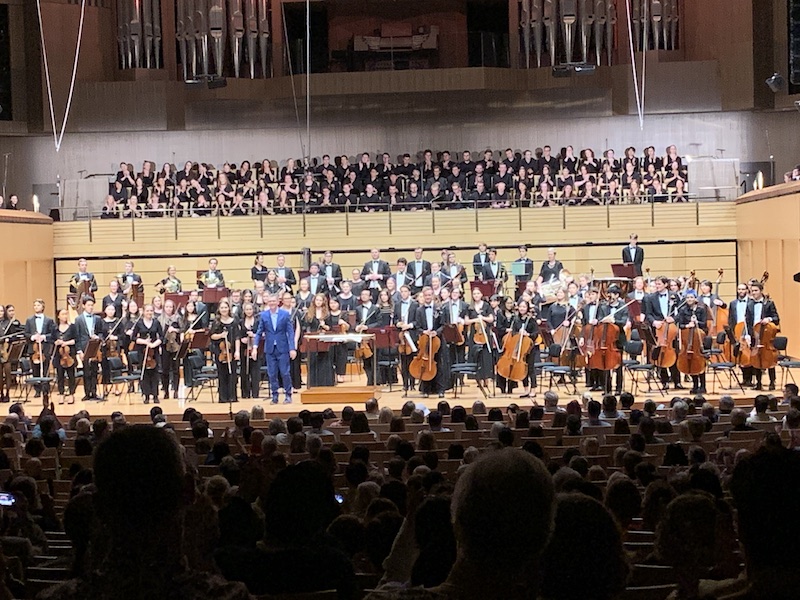Most music schools throughout the country mount special concerts to display their wares. Such exercises are good PR for the school within their campus and wider communities. They provide opportunities for students to perform unfamiliar music – sometimes composed by fellow students – alongside more familiar fare. Sometimes, they even present the fruits of scholastic research. They can even invite participation by players from other disciplines and schools outside the university. In effect, they are true community orchestras.
 Warwick Potter and the University of Queensland Symphony Orchestra. Photograph courtesy of the School of Music, University of Queensland
Warwick Potter and the University of Queensland Symphony Orchestra. Photograph courtesy of the School of Music, University of Queensland
Such was the case with the Vice-Chancellor’s Concert mounted by the University of Queensland in QPAC’s Concert Hall this past weekend. UQ’s Symphony Orchestra, around 90 strong, were marshalled for some 12 weeks through an entertaining program of Americana by their conductor Warwick Potter. The youthful and enterprising conductor is a former bassoonist, graduating from UQ with a PhD in Music Performance (Conducting) in 2015. On the basis of the three programs of his I have managed to catch in recent years, Potter has some intriguing ideas about programming for young players but there is still room for exploring more venturesome paths, as this program illustrated.
Opening the program with The Chairman Dances, John Adams’s self-described ‘off-shoot’ to his opera Nixon in China seemed like a good idea. But its glistening orchestration, much of it derived from 1930’s big band music, and metronomic pulsations requires special attention to balance and a beat. From my seat in the centre of the stalls, I could barely hear the strings, almost drowned by the unbridled enthusiasm of trumpets and trombones. I was reminded again of the uneven patchiness of orchestral sound in this auditorium and how difficult it is to balance an orchestra evenly there. It was lovely to see the enjoyment of these young players playing this music, further evidence of the existence of a John Adams Fan Club at UQ! Their empathy radiated out into the audience, even though they did take some time to settle into it, just as it took some time for us to adjust our ears to the idiosyncracies of the hall’s acoustics.
The centre piece of the program, of course, was Gershwin’s Rhapsody in Blue, with the concerto-like solo piano part played by Liam Viney, currently Acting Head of UQ’s School of Music. There was a deal of uninhibited energy and verve in this performance, most of it for the better, but balance issues remained. The soloist performed microscopic miracles with patches of rubato and unfamiliar ornamentation, producing moments I had never experienced before. Overall, it was a refreshing and, at times, revelationary performance, but I am not entirely convinced that QPAC’s Steinway was up to the task.
Last October, the orchestra gave an impressive account of Bernstein’s Serenade after Plato as a student graduation performance. The present program returned to Bernstein, this time with his 1965 choral work Chichester Psalms. For this, the University of Queensland Chorale, over 100 strong, was joined by school-age choristers from Ambrose Treacy College, Canterbury College and Mount St Michael’s College. Around 250 singers thronged the stalls around and over the orchestra. Singing the Hebrew texts without even a hint of unfamiliarity, they made a fine, concerted sound, signature qualities of the Chorale’s magisterial choirmaster Graeme Morton. At times, they produced the kind of chorus mysticus hush you might hear at an ethereal moment in a Mahler symphony. At other times, there was the kind of boistrous melee you might encounter at a Jewish wedding.
The solo part in the second section of the Psalms was sung by Miles Le Goullon, Head Boy Chorister at St Stephen’s Cathedral. Appearing onstage in his red chorister’s tunic, he immediately won the hearts of everyone in the audience and his singing only enhanced that impression. It was pure, even, unforced and totally affecting. Last year, during Bernstein’s centenary, I heard several performances of Chichester Psalms by professional orchestras and choirs around the country. On the basis of the singing from these UQ choirs, this performance eclipsed those I witnessed last year, including that by the Melbourne Symphony Orchestra last August.
 Warwick Potter and the University of Queensland Symphony Orchestra. Photograph © Vincent Plush
Warwick Potter and the University of Queensland Symphony Orchestra. Photograph © Vincent Plush
The success of Samuel Barber’s Adagio for Strings has overshadowed every other piece by this intently lyrical composer. It is de rigeur for every national memorial, presidential funeral and the like. Eight minutes of dripping emotion, it is difficult to sustain its intensity, but, stepping from the front desk of the viola section, student conductor Shing Him Chan avoided any semblance of Bernstein-like hyper-emotion. He managed to produce a cool yet affecting reading of this all-too-familiar work. With an economy of gesture and command of its slow crescendo and release, this was a performance to admire and savour.
Less so the work which followed, the Four Dance Episodes from Copland’s 1942 ballet Rodeo, which closed the program. Patches of over-cooked folk-fiddlin’ aside, for me this is the least interesting of Copland’s ballet scores and theatre music, and UQ’s performance did little to dispel that impression. It doesn’t take much to find more worthwhile pieces by Copland, the ballet music from Appalachian Spring or the rarely performed suite from the opera The Tender Land, for instance. The brass had a good time and so did the audience. Rodeo was somewhat rough and ready, a little saddle-sore, but an effective piece to close a concert of this nature.
The program’s actual title was only partly accurate. Yes, there was a lot of rootin’ tootin’ Americana, the sort of music you’d expect from the Boston Pops on a Fourth of July concert. Technically speaking, the concert’s focus was on rhythm, pulse and brilliant orchestration. Missing, though, were those great West Coast purveyors of rhythm – Henry Cowell, Lou Harrison and John Cage. Sure, there were moments of introspection and contemplation but, to my ears, it may have been simply too accessible.
I wished there might have been just one work which would have stretched the experience of these young players and the ears of the audience. Something by Charles Ives, perhaps, whom many regard as the fountain-head of American music. Not the first two symphonies or the Variations on ‘America’ but something more esoteric, ideally the Three Places in New England, with its patch-work juxtapositions of band music, hymnody and rural lyricism. Just as the UQ players and Brisbane audiences really do need to experience more music by Percy Grainger (hint, hint), they should also absorb Ives into their musical consciousness. Food for later thought, perhaps.
UQ’s next Vice Chancellor’s Series concert, on October 20, looks wonderful – the local premiere of Eumeralla, a war requiem for peace by Deborah Cheetham, with the composer herself singing the solo soprano role.
With similar activities from the Queensland Youth Orchestra and the Con, these concerts signal the continuing blossoming and expansion of youthful music-making in Brisbane, unparalleled, in my experience, in the country. Moreover, the UQ series sends an important signal within the university itself: music is not simply some agreeable adjunct to the more tangible business of the campus. It is core to its soul and capacity to bind many different disciplines together. Long may these concerts continue to flourish, celebrating the impressive, proud and distinguished history of music at the University of Queensland.











Comments
Log in to join the conversation.